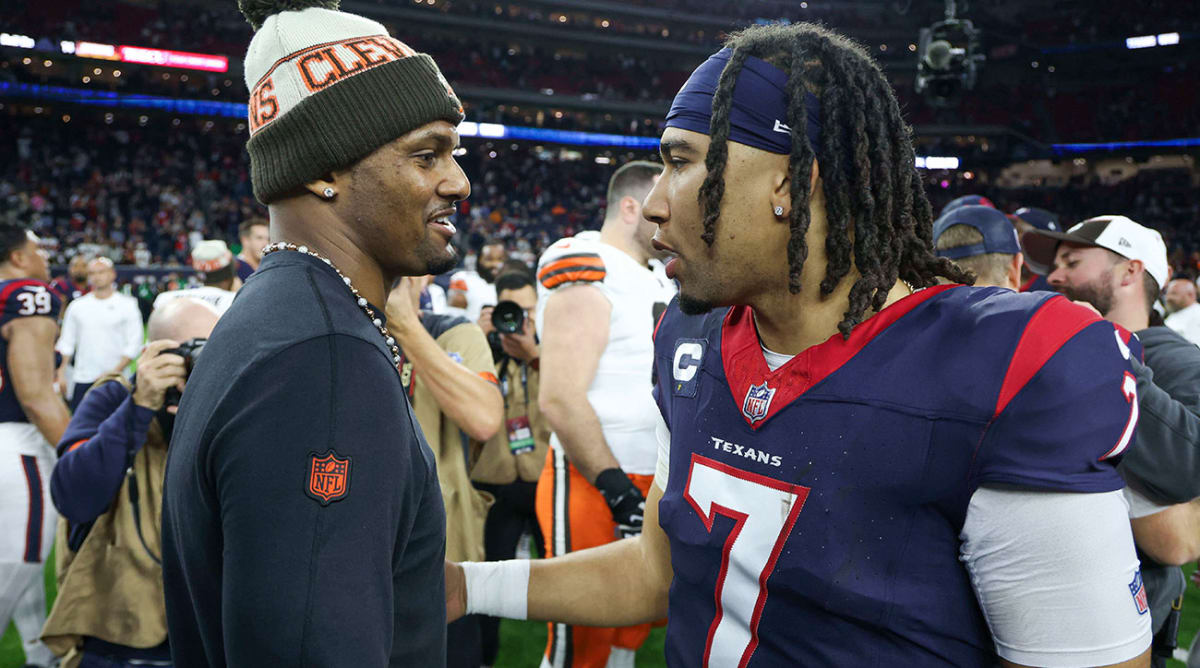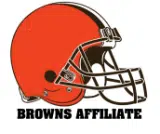We have a habit of constructing narratives around singular moments such as the Houston Texans’ blowout win over the Cleveland Browns on Saturday night, to give the games a little more heft. But, I’ll spare you the take that Texans GM Nick Caserio was the true genius behind the Patriot Way or that his 2023 draft was one of the great coups in NFL history. These moments tend to be fleeting, and three years from now, we could be debating whether the Texans should pick up C.J. Stroud’s fifth-year option.
We have no idea what the future might hold. The NFL is strange like that.
But here’s a truth coming out of the wild-card round that I find to be irrefutable: Houston’s win should forever destroy the blockbuster quarterback trade. The backbone of this Texans team was generated via the Deshaun Watson deal, the dividends of which are still being paid out. Houston was able to net players such as Dameon Pierce, Tank Dell, Will Anderson Jr. and Kenyon Green, and those selections allowed them, by proxy, to utilize their own capital to pick both Stroud and Derek Stingley Jr. There are still another two picks in the 2024 draft, one in the first round, that Houston has to play with.
Don’t worry. There’s an entire offseason to make fun of the Browns and how, even by finding some degree of success this year, they may have done the most classically Browns thing ever. They paid dearly for a player who was weighing down another team considerably from an emotional standpoint and spent dearly for the right to it. And, by getting boat raced in the playoffs by that player’s old team, powered by the draft capital they handed over, bettered the pick they must surrender in the upcoming draft. To quote Father John Misty: Oh, comedy, it’s like something that a madman would conceive!
Anyway, the Browns have not yet felt the entirety of the Watson hangover, but the Denver Broncos certainly have after their own megatrade, which gives us a reference point. The Broncos essentially tried to publicly embarrass Russell Wilson into altering his contract so it was easier to get out of. Both of those teams decided that they were one player away, without realizing that there are so many alternate routes to success and without asking themselves sternly enough why those quarterbacks were available in the first place. While I won’t rope the New York Jets completely into this comparison, given that Aaron Rodgers didn’t cost them an absurd amount in terms of draft capital (but a great deal of time chewing fingernails nervously while watching the Pat McAfee show each Tuesday), they, too, are watching Rodgers’s old team in the postseason while sitting at home.
All of these teams, I feel, also gravely miscalculated the harshest modern reality of tying up that much cash, responsibility and draft capital in one player: the power and leverage that singular player then possesses. Wilson’s own hubris and the Broncos’ allowing of a free reign during his first year in Denver completely ruined a season. There’s still a long way to go for Watson in Cleveland. Will it ever get that bad?
Houston doesn’t have that problem anymore. If any of the Texans’ draft picks sour—if any of these in-moment narratives about the Texans’ bright future and the meaning of their success cave in on themselves—they can just move on.
While the sensible retort here will be to mention Matthew Stafford and Tom Brady who, in consecutive years, won Super Bowls immediately after leaving their longtime teams, I would also note that the Los Angeles Rams were in the Super Bowl three years before bringing in Stafford, with much the same roster. The Tampa Bay Buccaneers, given the fact that they were inheriting specifically the greatest player in NFL history, had nothing to lose by bringing in Brady. And, Brady was a free agent, so he cost them no draft capita. Given Brady’s age, the deal was always going to be short term. If it all imploded, the Buccaneers would have had the increase in ticket sales to buffer the fall from grace.
Like we mentioned above, the NFL is so fickle; it turns in such a rapidly cyclical pattern that the only real value is in access to a cheap pool of young players who come directly from the college feeder programs which, in turn, inform the next iteration of groundbreaking schemes. Players phase in and out of relevance. The Patriots were able to succeed for 20 years partially because of Tom Brady, but also because they kept taking what the current economics of the NFL were giving them and formulating an edge out of what some might believe were hardships or predicaments.
Look at the stars of Sunday’s game for Houston:
• Stroud: a 2023 first-round pick (No. 2)
• Will Anderson: a 2023 first-round pick (No. 3)
• Christian Harris: a 2022 third-round pick (No. 75)
• Nico Collins: a 2021 third-round pick (No. 89)
By accepting life on the other side of a franchise quarterback instead of groveling, by seeing the bright side of a windfall of capital, Houston endured just two bad non-Watson seasons, and is in the midst of an inspiring playoff run that has netted 11 wins so far this season alone.
There has been sound enough research about the fallacy of winning now. A Nobel Prize–winner once begged Daniel Snyder not to make what ended up becoming the 2012 trade up for Robert Griffin III based on the processes of someone who, you know, won the friggin’ Nobel Prize. That advice was ignored. Since drafting Griffin the franchise has had three winning seasons (with records of 10–6, 9–7 and 8-7-1, by the way).
Since trading for Watson, Cleveland has had some highs, though most of them came with Joe Flacco under center and Watson recovering on the sideline. But they did get excellent seats for a viewing of what could have been.



















